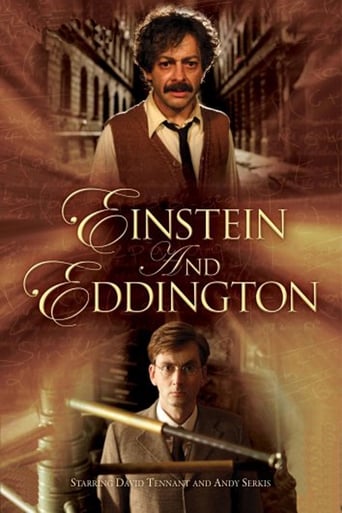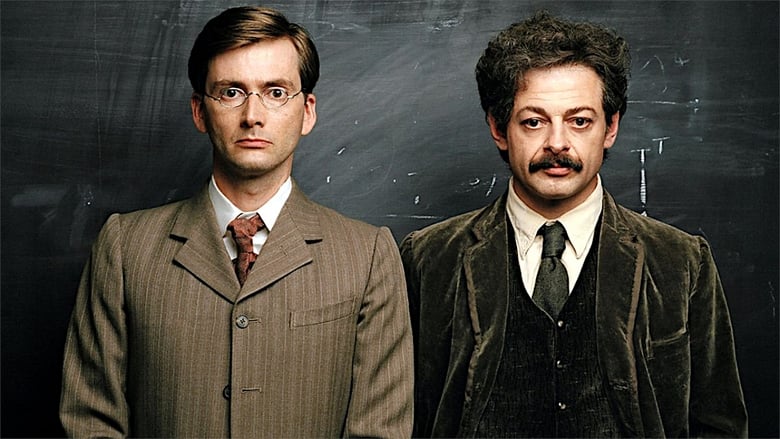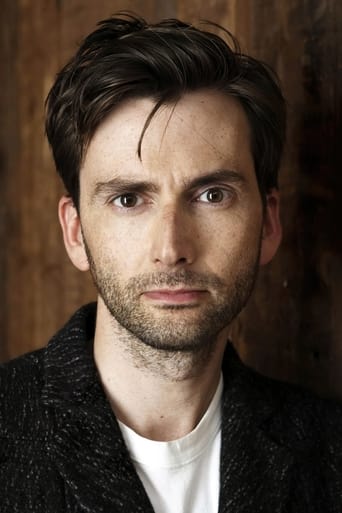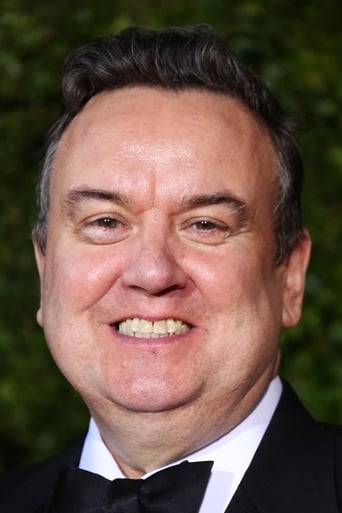

Einstein and Eddington (2008)
A look at the evolution of Albert Einstein's theory of relativity, and Einstein's relationship with British scientist Sir Arthur Eddington, the first physicist to understand his ideas.
Watch Trailer
Cast


Reviews
This is one of the greatest scientific movie i have ever seen as it illustrates a scientific theory during the drama of the movie which makes you more concern to know more and more about how scientists live their life and how they face such hard obstacles in order to achieve success .Einstein is one of the greatest scientists ever and his theory of relativity has changed it changed people's minds of what they were thinking about gravity . But , this movie contains sexy explicit scene and passionate kisses , so it is not suitable for children as mentioned in parents guide . If you more concern about science , you will enjoy this movie a lot .
I am not a scientist, I have no scientific bent. Nor have I ever studied the odd couple pairing of Einstein and Eddington. I simply have the greatest of respect for David Tennant as an actor, and so watched this film with an eye to Mr Tennant's performance. However, my expectations were more than met with this tribute to an early 19th century event, which changed the course of science as it had been known before. Evidently, Einstein, a German born scientist with 'crazy' ideas, had moved to Switzerland to marry and raise a family, while Arthur Eddington, a gay, Quaker, pacifist, was just finishing up his years at Cambridge. Lauded as an heir to Sir Isaac Newton, Mr. Eddington had a seat at Cambridge, despite his being a pacifist, much frowned on by the many Lords and gentlemen who had donated a son to the 1st World War. Especially as the battle of Ypres raged, and 15,000 were lost to chlorine gas, Mr. Eddington's passivity rubbed raw the sensibilities of a nation against Germany in particular. Meanwhile, Einstein had been lured to Berlin, in hopes that his theories would provide war capable weapons. As it happened, Einstein was against the war, and did not wish that his theories be used as weapons. And so, given his 'relinquishment' of his German residency, as a 'Citizen of the World', his life was reigned in by the German powers, and he became unable to have a voice in his community, be it scientific or personal. And of course, during World War 11, he was excoriated as a Jew, and barely fled with his life. The US wanted his knowledge, and of course, eventually, the atomic bomb was invented, based on his theory of relativity. But that was many years after this moment in time. Arthur Eddington discovered a variation in the known elipse of Mercury, and with the help of a German family he had rescued from a violent English protest, sent a translated letter to Einstein explaining his new theory. Einstein was unable to answer him, due to the German soldiers denying his entrance to his only post box. However, Eddington and his scientific companion convinced Cambridge University to pay for a trip to Africa, in order to prove a new theory on the relationship of the stars to the sun, during a total eclipse. Einstein, of course, went on to incredible fame and notoriety. Eddington, however, did not pursue fame, and faded into obscurity. This is a wonderful film, and trust me - you needn't know science to understand what this adventure is all about. Enjoy!
Although this was easy and enjoyable to watch, the characters all lacked depth and the script in general was rather superficial, simplistic and ultimately unsatisfying. It could have been so much more, given the fascinating setting and the magnitude of the underlying facts. The science itself was almost completely omitted or dumbed down. It was disappointing that there was a rather cheap and unconvincing attempt at a religious 'miracle' as well as some one-dimensional and unnecessary politics. On the positive side, Cambidge university in the WWI era made for a pleasing backdrop and the actors' performances were decent on the whole.
This is a superb drama, combining a well-presented scientific and historical explication of Albert Einstein's theory of relativity alongside a gripping portrait of the moral dilemmas that scientists have to struggle with as they try to reconcile the demands of country and conscience.The twin leads British scientist Arthur Eddington (David Tennant) and Einstein (Andy Serkis) lead very different lives but face not only similar scientific opposition and derision but also similar pressures to back their country's efforts to win the First World War. Tennant shakes off the Dr Who expectations in pointing up the problems of a gay pacifist Quaker who tries to prove the new-fangled theories of 'enemy' scientist Einstein a theory especially dangerous because it undermines the ordered view of the universe created by English scientist Isaac Newton. Einstein's complicated private life is compounded by his revulsion at fellow scientists' work in developing poison gas. Both Tennant and Serkis get right into the skin of their characters - two brilliant actors on top form.The drama brings over very effectively the transition from the comfortable life of the scientists in pre-war Cambridge and Switzerland to the tragedies of war. Jim Broadbent as Sir Oliver Lodge and Donald Sumpter as Max Planck lead the scientific establishments in Cambridge and Berlin as they pervert their scientific beliefs to condone mass killing on a scale never before seen. The main female roles have rather less to do, but Rebecca Hall as Eddington's sister, Lucy Cohu as Einstein's abandoned wife and Jodhi May as his mistress all add an extra warmth to the production and help to avoid the danger of focusing only on clever men using symbols and formulae to bemuse their colleagues (and the audience).The settings Cambridge, Berlin and West Africa, where Eddington photographed a total eclipse of the sun to prove the Einstein's theory was right provide a powerful backdrop to the human drama, making it all the more believable. All in all, a very successful and informative BBC and HBO drama that maintains tension and excitement throughout.




